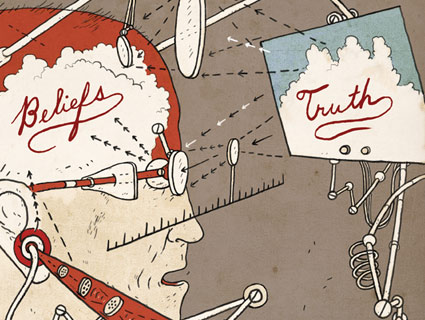
NASA's Curiosity rover, spending your tax money in the name of cool science.NASA
Wait, did science publishing maverick Michael Eisen just borrow a tactic from the late internet whiz kid Aaron Swartz?
Why yes, he did.
The headline for my new profile of Eisen wasn’t meant to be taken literally. As I explain in “Steal This Research Paper! (You Already Paid for It.),” Swartz was indicted by the federal government for trying to do just that: He’d gained access to MIT networks to “liberate” millions of copyrighted scientific papers, most of them bankrolled by taxpayers through the National Institutes of Health (NIH) and other federal agencies. Swartz and others in the open-access movement believed that the public should be able to view publicly-funded research without forking over stiff access fees to science publishers. Seems like a no-brainer, huh?
Eisen shared that sentiment, but until the other day, he had never resorted to such brazen methods. Instead, he and two colleagues—his mentor Patrick Brown of Stanford and Harold Varmus, a Nobel laureate and former NIH director, worked within the system and launched an entity called the Public Library of Science.
A new kind of scientific publishing house, PLOS (which celebrates the 10th anniversary of its flagship title, PLOS Biology, this week) turned the traditional model on its head. Instead of charging an arm and a leg for access, it instantly publishes all of its papers online—for free.
PLOS has transformed the industry, and spawned a host of imitators, by showing that open access can be a viable business model. “I’m very fond of rebellion,” Varmus replied when I ask how he felt about Swartz’s approach. But, he continued, “I feel a tinge of anxiety about going outside the law. If you push the envelope too far, you end up getting in trouble.”
Last Friday, Eisen pushed that envelope clear off the desk. NASA had just published its first series of papers based on data from the Mars rover Curiosity in the prestigious journal Science, which is available only by subscription. That didn’t sit right with Eisen, who wrote a blog post titled, “NASA paywalls first papers arising from Curiosity rover, I am setting them free”:
There’s really no excuse for this. The people in charge of the rover project clearly know that the public are intensely interested in everything they do and find. So I find it completely unfathomable that they would forgo this opportunity to connect the public directly to their science. Shame on NASA.
This whole situation is even more absurd, because US copyright law explicitly says that all works of the federal government‚ of which these surely must be included—are not subject to copyright. So, in the interests of helping NASA and Science Magazine comply with US law, I am making copies of these papers freely available here…
Oh, yes he did.
“Awful move by NASA. Bold move by Eisen,” one admirer tweeted. “Applaud his decision, hope he’s got a good lawyer.” To be sure, the American Association for the Advancement of Science, the nonprofit scientific society that publishes Science and one of Eisen’s nemeses, may choose to give him a hard time about this.
Yet Eisen may have the law on his side. Many (though not all) of the authors of the NASA papers are federal employees, and that could make the work public domain.
And lo and behold, apparently in response to Eisen’s activism, NASA’s Jet Propulsion Laboratory has now posted the papers on its website. In an update to his post, Eisen writes, “Let’s hope that in the future that all NASA papers—and indeed the results of all government funded research—are made immediately freely available.”
There’s really no excuse for this. The people in charge of the rover project clearly know that the public are intensely interested in everything they do and find. So I find it completely unfathomable that they would forgo this opportunity to connect the public directly to their science. Shame on NASA.
This whole situation is even more absurd, because US copyright law explicitly says that all works of the federal government – of which these surely must be included – are not subject to copyright. So, in the interests of helping NASA and Science Magazine comply with US law, I am making copies of these papers freely available here:
– See more at: http://www.michaeleisen.org/blog/?p=1430#sthash.hjtt9BQM.dpuf









